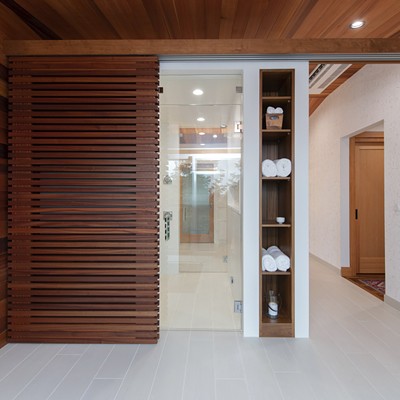Remember the 1999 cult comedy Office Space? Remember Milton Waddams, that mumbly, pock-faced little mole who was constantly dissed, downgraded and demoted until (spoiler, 11 years later!) he burned the place down?
Christina Geithner’s research would suggest Milton’s story isn’t that far from reality. Geithner, an associate professor in Gonzaga’s Exercise Science department, has written two papers (she also spoke at the recent Working Women’s Survival Show) about the importance for both workers and bosses to strike a balance between life and work — and the consequences for both if they don’t.
You say in your studies that work stress has become a ‘universal phenomenon.’ How did that happen?
Work stress has probably always been there, since the dawn of time and work. But it’s gotten increasingly more serious, as we’ve been able to do more in shorter periods of time, and the expectations have gone up. Globalization is a huge factor. There’s an expectation for being on 24/7.
How does America rate in terms of balancing work and life?
We’re pretty poorly off. There are some European countries — the U.K. is a great example — where there are instituted vacations, and there is support for that countrywide. Japan is one of the worst. I think we are as well.
There’s such pressure to perform, even when on vacation. My brother works for NASA, and we just celebrated our dad’s 80th birthday. He had two conference calls, one of which went on for about two hours. He was constantly on and off the phone, doing business with colleagues. My sister is connected at the hip to her Blackberry. These technological advances offer lots of advantages, but that accessibility also doesn’t leave us any downtime to renew ourselves and reflect.
What does this kind of imbalance cost us — both on the corporate and corporal levels?
On the corporate level, there tends to be less productivity — lower performance for the organization and for employees as individuals, higher absenteeism, partly due to health and partly because people are not looking forward to coming to work.
For individuals, that work-life imbalance, which creates stress, results in not only dis-ease, but disease — chronic disease. Stress related to work imbalance has been linked to everything from headaches and upset stomach to all-out coronary heart disease, stroke, hypertension — that’s a biggie. [And] when people are under stress, they are driven by these rising or higher cortisol levels to seek more high-fat, high-sugar foods. It’s sort of a vicious cycle.
So what are some things that employees can do?
One thing is just recognizing work imbalance when it exists, or recognizing stress. Because then you have the opportunity to take action — changing the stressor or the work-life imbalance. One example might be asking for the technological or financial or personnel support you need to get your job done well. Another approach to taking action is shifting perspectives — recognizing the good things in a situation, what’s working, what’s not. And then, if you have no control over the situation, possibly just stop complaining about it and wishing it were different and just accept it, or just move on.
Another thing would be to practice mindfulness — being aware and present, without judgment, allows you to see when you’re feeling more balanced and when you’re not. That allows you to know when to take action. It gives you an opportunity to respond, rather than to have a heart attack or to blow up with your supervisor.
What about the employee working the dead-end mindless factory job, who has no control over their workplace?
That’s a really tough situation. Maybe you can make your relationships with your co-workers more of a focus, as long as you get the job done. It could be focusing on ‘This is what I do for this eight hours of my day, but what can I do with the rest of my 24 hours?’
You say employees need to work on themselves in order to work with others. How do you balance the two?
I can think of an analogy: Who would you rather have as a doctor? Someone who has had adequate sleep, who exercises regularly, takes time to listen? Or someone who may be terrific at what they do in terms of medical school preparation, competitive in their field, but they’re harried, tired and impatient? Who do you think you’ll get better care from? If you don’t take care of yourself, you can’t do your best for your patients, your co-workers.
People think, ‘Oh I’m being selfish by working out on my lunch break.’ If they can instead consider the impact on other people, that helps take the selfishness out of it.
What are some specific things that employers can start doing today to help create the proper life-work balance?
Three things. One would be the physical environment — workplace design, ergonomics, physical demands of different jobs, adequate lighting. That’s fundamental.
The second thing would be the cultural and social environment — the space and the community you create. The relationships you have with people. How you treat your employees, how the leadership interacts with employees and also the support and clear communication [that’s needed].
And then healthy lifestyle practices: health or wellness programs, health screening, modeling healthy lifestyles. Some people in management are really good about that. They do work out regularly, or they do choose healthy foods — at least at work. They’re not working crazy hours. They set the tone for other people to emulate.
So your work environment must be pretty sweet…
There’s a pretty relaxed environment in our department. We each have an office space. We’re in close enough proximity that we can interact very easily, but we also have privacy. We have showers in our two restrooms. Three out of the five full-time employees here have dogs, and they bring them to work regularly. If you’re having a rough day or you need a little pick-me-up, you can go play with one of the dogs, and things are looking up.
Our department is also very good about giving us leeway to do our work and do it the way we feel we need to. We’re not looking over each other’s shoulders every other minute. There’s a trust in the competency of our fellow colleagues.
This is really important for people in leadership positions to be aware of. There’s loads of research out there that supports that making efforts to support work-life balance for employees. The whole workplace culture only ends up benefiting the company or the organization. It’s a win-win.
















